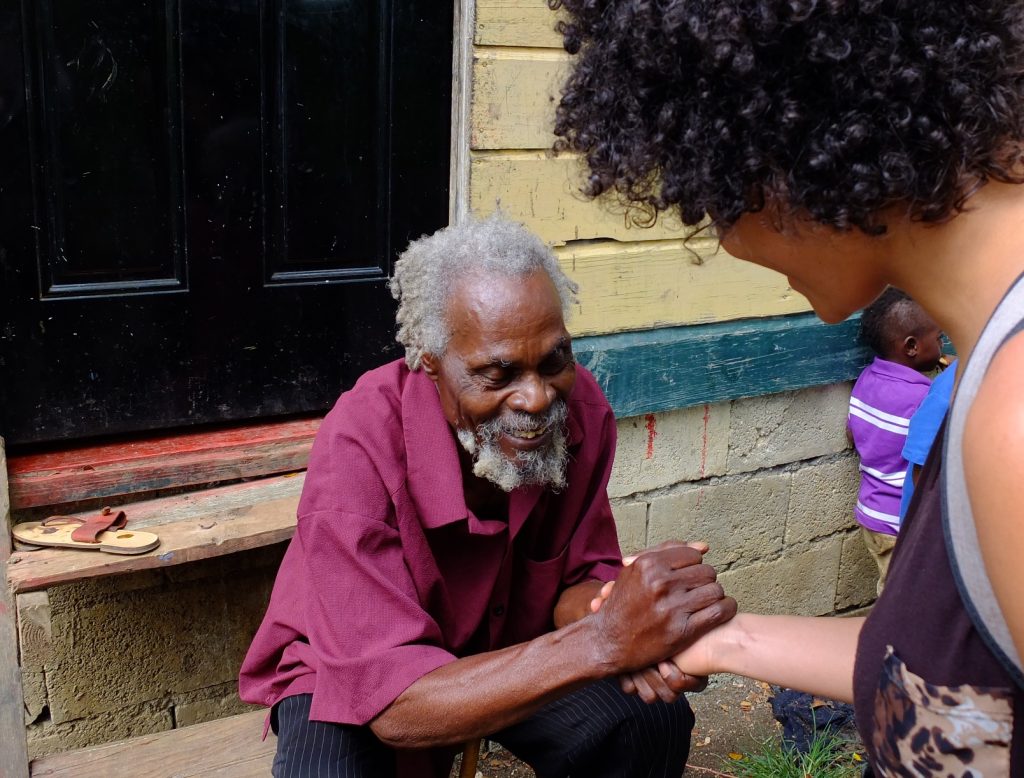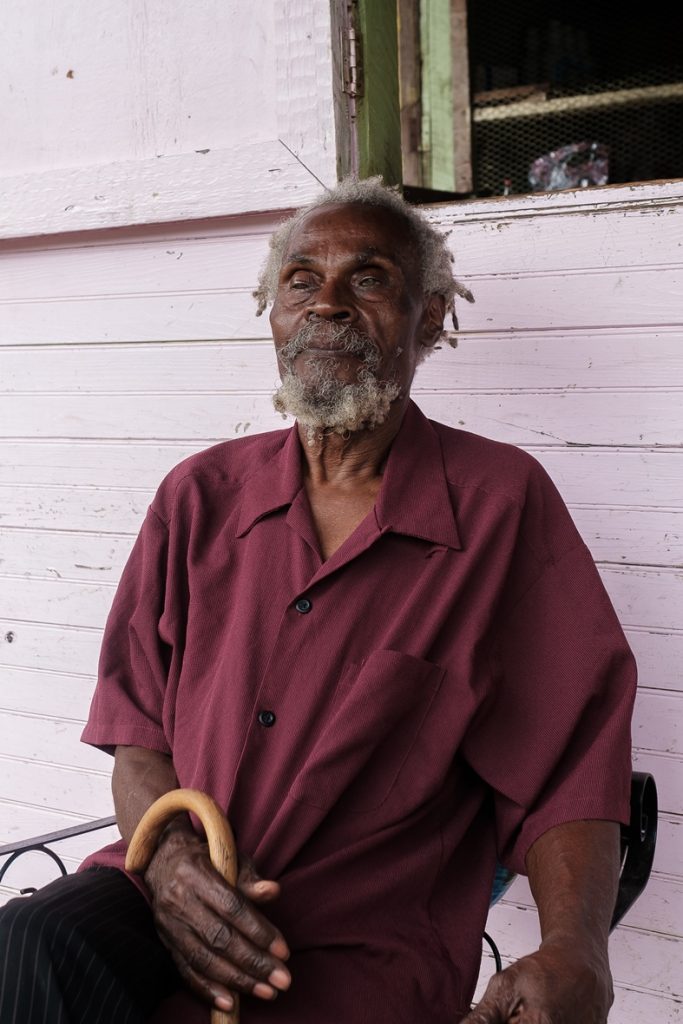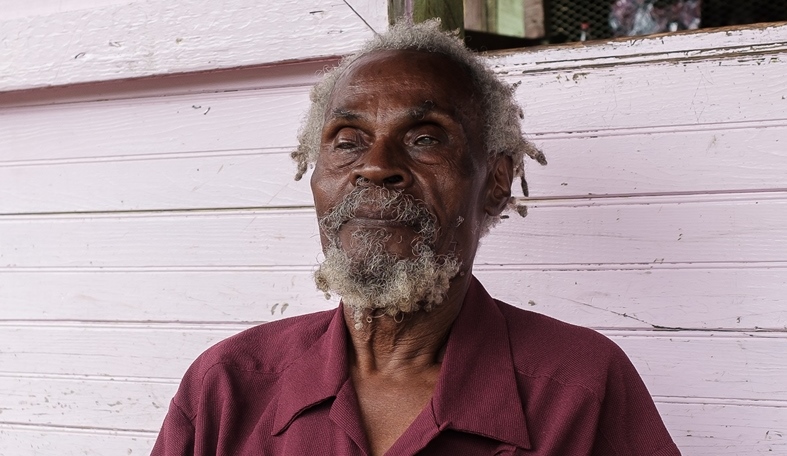“I love music, and I cannot stop doing music. I have to just keep on doing music, for it’s born in me from I was a kid, so I love it.” (Porti in an interview with reggae-vibes.com)

Another foundation artist has left us: Glasford Harold Manning, better known as simply “Porti”, was called home on February 10th 2024. He would have turned 81 next month, and we want to honor this gentle and friendly soul by looking back at his life, long and rich in experiences, but certainly not always easy.
Born on April 23rd 1943 in Strathbogie, Savanna-La-Mar (Westmoreland, Jamaica) to Blandell Hill and Harold Manning, he grew up with six siblings: Patricia, Erica, Icey, Lloyd, Bertram and Kenneth. He attended the Cashew Walk Elementary School in Grange Hill and went to Kingston to learn the steelwork trade at Matolon Constructions. In his free time, he played his guitar and sang a few tunes, and when people told him that he had a good voice, he started considering a musical career.
At age 19, he founded his first band called “Time Unlimited” in 1972 with Owen Marshell, Orville Smith and Junior Delgado (who was called Junior Hibbert back then). They worked with producers such as Rupee Edward, Duke Reid and Lee “Scratch” Perry and had a hit called “Reaction” in 1974. Many of the songs recorded for the Upsetter in that time were written by Porti (as he explains in an interview with reggae-vibes.com), but even though some of them were re-released by both Perry and Delgado, Porti was never credited for the songwriting. A few years later, Porti left the group and founded another band called “The Jewels” with Benjamin Daley and Lynford Newland. They worked with Niney The Observer and were later signed to the label Cash & Carry Records, owned by Trevor “Leggo” Douglas. Porti also recorded a few solo tracks in that time (see below), and seems to have started working on a release with Caveman and Sizzla around 2000.
Not much is known about his personal live. His daughter Kerry-Ann, who grew up with her aunt, tells us: “He was just a gentle, quiet man, constantly traveling all over the island, from Trenchtown to Westmoreland to the Red Hills – he wasn’t a man to stay home. I know he used to be around Dennis Brown, Gregory Isaacs, Toots and The Maytals, all of them used to come and visit him. Toots was my brother’s godfather, Gregory Isaacs was my godfather.”

Since Porti never had a big break-through musically, he retired from studio work and moved away from the hustle and bustle of city life. For years he called a little wooden shed in the Red Hills surrounding Kingston his home, living off farming and what little money he could make with odd jobs. It was there that producer Jake “Mista” Savona found him in 2014 (watch the video here): “He was so hard to track down! After years of trying to locate him, me and my bredren Nova, with the help of Leggo, finally found him this afternoon chilling and holding a vibe in the Red Hills district. I took him and Benji to the studio two days later. It was the first time The Jewels had been in a music studio since the ’80s!” One of the tracks recorded during this session found its way to Mista Savona’s famous “Havana Meets Kingston” compilation (released 2017): the song is called “100 Pounds Of Collie” and features Cornel Campbell, Leroy Sibbles, Prince Alla and The Jewels as well as Exile Di Brave, Cali P and Lutan Fyah.
Shortly after this encounter, his rapidly diminishing eyesight made it necessary for Porti to leave the solitary mountains, and since the only place to go was his remaining family in Westmoreland, he moved there. Having learned of his medical problems, the Adabu Foundation decided to support this veteran and contacted his daughter Kerry-Ann in Kingston in 2018. She told us that he felt lonely “up country” and that he’d like to come back to the capital, so when we returned in 2019, we organized a visit to Westmoreland to take some pictures and to interview him about his life and his work in order to start a fundraiser to finance his move. However, when China Hopson (photographer) and Gardy Stein (chair Adabu Foundation) finally arrived at his dwelling place, an angry family member prevented us from doing what we came for. Without giving us a chance to explain our intentions, he cursed the “Caucasians trying to steal the knowledge” and accused us “to exploit and profit from Rastafari”. He insisted that we should go to a lawyer before conducting any kind of interview, which of course was not possible (and is a ridiculous request for press representatives, anyway). When asked how he thinks we would steal and exploit, he didn’t answer, refusing to speak with us any further. Unfortunately, since Porti was living on this person’s premises, the elder wouldn’t go against this errant judgement, and so we had to tell him goodbye without being able to have that interview with him.
Luckily, thanks to a few donations by the Adabu Foundation and the incessant help of his daughter, Porti was able to move back to Kingston the next year, where he lived humbly but comfortably in deep Rastafarian faith and his chosen spiritual order of Nyabinghi until he passed away. With him, the reggae world has lost a brilliant songwriter and vocalist, and a wonderful person.
Rest in Eternal Peace, Glasford “Porti” Manning!
Porti’s discography (far from complete!):
Time Unlimited – Run Ball Head (1972, Success Records, prod. by Rupie Edwards)
Time Unlimited – Rastaman Going Home (1974, Upsetter, prod. by Lee “Scratch” Perry)
Time Unlimited – Reaction (1974, Reflections / Pressure Sounds)
Time Unlimited – Judgement (1974, Upsetter, prod. by Lee “Scratch” Perry)
The Jewels – Jah I (1977, Observer, prod. by Sir Niney)
The Jewels – Black Is The Highest Culture (1977, Observer, prod. by Sir Niney)
The Jewels – One Little Lick aka Mr. Bigman (1977, Observer, prod. by Sir Niney)
(also featured on the compilation “Observation Station” released by Niney The Observer in
1990 and in the “Roots & Culture” Box Set released by Trojan in 2005)
The Jewels – Slave Trade (1979, Cash & Carry Records, prod. by T. “Leggo” Douglas)
The Jewels – Love & Livity (1979, Cash & Carry Records, prod. by T. “Leggo” Douglas)
The Jewels – I Believe In Love (1979, Cash & Carry Records, prod. by T. “Leggo” Douglas)
The Jewels – Dream Lover Babe (1980, Cash And Carry Records)
The Jewels – Singing Sweet Harmony (1981, Leggo Sounds)
Porti Jewel – Staring At Me Girl (1981, Leggo Sounds)
Porti Jewel – Poor People Are Crying (1985, Cash & Carry Records)
Porti Jewel – Inside Up Upside Down (1986, Leggo Sounds)
Porti Jewel – Prophecy Call (2007, VP Music – Reggae Anthology: Niney The Observer)

